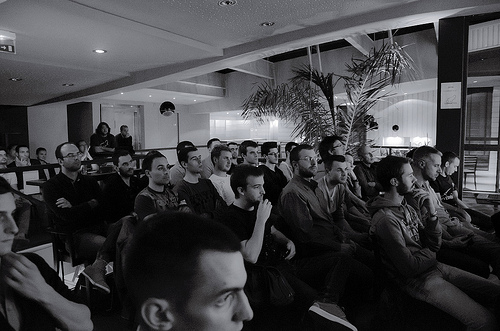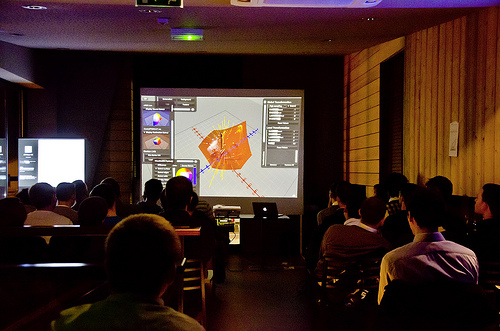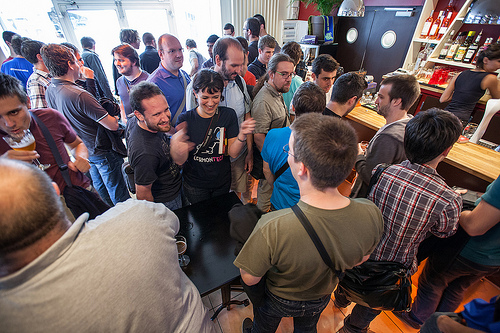⚠️ This content has been written a long time ago. As such, it might not reflect my current thoughts anymore. I keep this page online because it might still contain valid information.
The story behind Clermont'ech
— Clermont-Fd Area, France2025-03-01 // I proofread this article.
One year ago, Julien, Pierre, Manuel, Jean-Philippe, Julien (yes, again) and I created Clermont’ech, a non-for-profit organization dedicated to gathering developers in our city. Our goal was simple yet impactful—organize conferences every two months, known as the API Hours.
Reflecting on the past, attending conferences such as Symfony Live 2011 and the ParisJS events when I was living in Paris was an eye-opener. When I returned to Clermont-Fd, I talked to some of my friends about the idea of organizing conferences here, between the volcanoes. Unfortunately, we were all quite busy, and nothing happened. This was in 2011.
My journey took a significant turn when I moved to Switzerland. There, I discovered the power of simplicity and freedom: Wanna do something? Well, just do it! In other words, if you never try you will never know. Back to Clermont-Fd again, I connected with Julien Maupetit who wanted to build a Python community:

Yeah, there isn’t a lot of Pythonistas in our area. However, there are PHP, Java, .NET, …, and JavaScript folks. Hence the idea of not being focused on a single technology or programming language, but rather, targeting developers at large. That is how Clermont’ech is born, exactly a year ago.
Julien was really a catalyst, and it was also the right moment, I guess. We discussed the idea with the LavaJUG folks (Java User Group), the first local tech organization, which provided invaluable guidance.
The first thing we did was to all agree on a manifesto with four strong values:
- Openness: we are technology-agnostic, everyone can join the flock;
- Independence: we are not tied to any company or organization, no matter how much they could give us;
- Respect: people who stir up trouble are not welcomed;
- Sharing: every decision we make is driven by this value, we don’t just promote sharing through the conferences.
A year later, I think that this was our main key success factor. We always stick to this manifesto, we had a clear vision since the beginning, and we all shared the same point of view.
Then, we tried to create our own identity, and we choose the platypus as our mascot. Why? Because, platypus are cool, and will always be cool. End of the story. A special thanks goes to Sophie, our outstanding web designer, by the way.
The first event was awesome, even though we had no money, no experience in organizing an event–only a MacBook Pro and a camera. We got more attendees than expected. Unbelievable. The next API Hours went well, and we reached our limit of 50 attendees after the second event. The idea behind limiting the number of attendees was pretty straightforward: we wanted people to meet other people, and make the events more friendly.
We were more and more prepared, with more equipment, and a lot of goodies! That is probably the second key success factor: focusing on the marketing stuff. This led us to the notion of sponsorship, i.e. money. Since the beginning, we wanted our events to be free of charge for the attendees, but also, providing food (we are French after all). Thanks to our fabulous sponsors, we were able to do more, making t-shirts, stickers, business cards, postcards, but also chocolates!
We held the events in different places, and not always the same day of week so that new people could show up. We took care of a lot of similar aspects (e.g., food for vegans and non-pork eaters, live streaming for those who didn’t get a ticket, and many more you can’t probably think of).
But, conferences without speakers are nothing. We wanted the API Hours to be community-driven and that is why we decided to find speakers locally. Most of our speakers never spoke at any conference before, but they were all good!
Thanks to these events, I met a lot of interesting people, and not only developers. I also heard about topics I would not have explored myself. We’ve built a vibrant community of approximately 130 individuals (based on our mailing-list), all involved in computing. I think we are quite well-known now, since local universities asked us to come and speak to their students. 2014 promises exciting developments as we continue to expand and refine our initiatives.
If your city lacks a tech organization, consider creating one. It’s an endeavor worth undertake—it could become a fantastic adventure!
ℹ️ Feel free to fork and edit this post if you find a typo, thank you so much! This post is licensed under the Creative Commons Attribution-ShareAlike 4.0 International (CC BY-SA 4.0) license.


